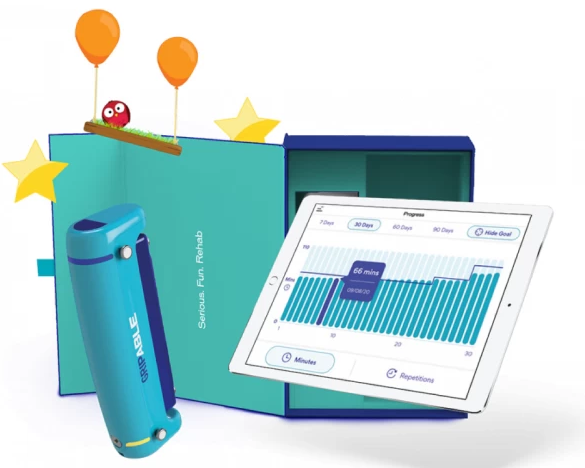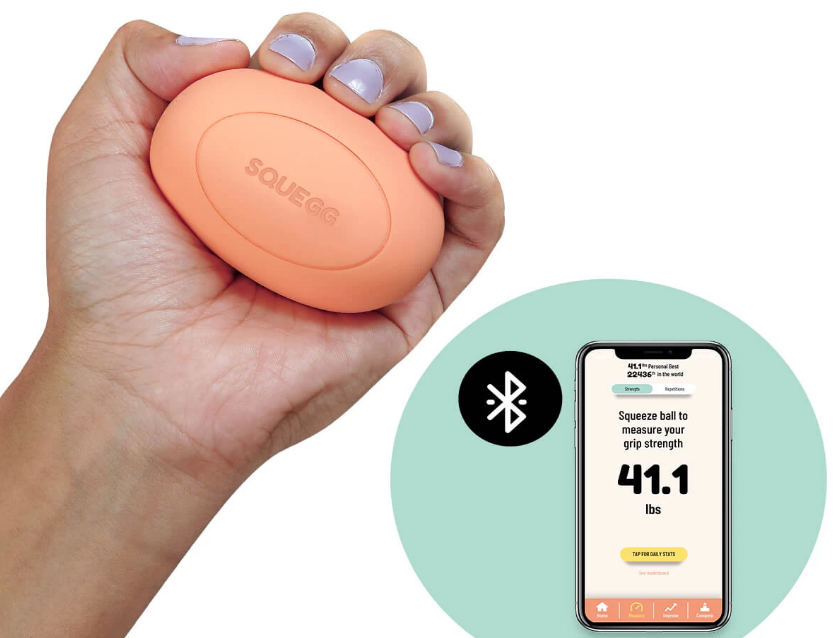Reha-Stim Bi-Manu-Trainer The Bi-Manu-Trainer supports patients with sensory-motor and cognitive impairment during rehabilitation. It provides interactive uni- and bimanual training exercises with focus on visuomotor finger, hand and arm coordination using Virtual Reality based games and sophisticated sensor technology. The game-based learning approach leads to high patient motivation resulting in higher training intensity. High patient motivation through game-based learning Challenging therapeutic training games lead to high patient motivation and ensure a long-lasting patient adherence. This approach leads to an up to three times higher intensity compared to conventional therapy. Visual feedback supports the therapist and allows independent training The intuitive software is easy-to-use for every patient and visualizes the training success. It thus supports therapists with a direct feedback to the patient. The compact design and simple setup of the Bi-Manu-Trainer allows an independent training of patients saving time for therapists. Pressure sensor for improved ADL relevant training A force sensor allows the therapy to focus on finger sensitivity and force. It supports the training of ADL relevant functional tasks, e.g. the paretic arm supports the healthy arm’s task performance (e.g. when cutting vegetables etc.).
Reha-Stim Bi-Manu-Trainer The Bi-Manu-Trainer supports patients with sensory-motor and cognitive impairment during rehabilitation. It provides interactive uni- and bimanual training exercises with focus on visuomotor finger, hand and arm coordination using Virtual Reality based games and sophisticated sensor technology. The game-based learning approach leads to high patient motivation resulting in higher training intensity. High patient motivation through game-based learning Challenging therapeutic training games lead to high patient motivation and ensure a long-lasting patient adherence. This approach leads to an up to three times higher intensity compared to conventional therapy. Visual feedback supports the therapist and allows independent training The intuitive software is easy-to-use for every patient and visualizes the training success. It thus supports therapists with a direct feedback to the patient. The compact design and simple setup of the Bi-Manu-Trainer allows an independent training of patients saving time for therapists. Pressure sensor for improved ADL relevant training A force sensor allows the therapy to focus on finger sensitivity and force. It supports the training of ADL relevant functional tasks, e.g. the paretic arm supports the healthy arm’s task performance (e.g. when cutting vegetables etc.).
Reha-Stim Bi-Manu-Trainer The Bi-Manu-Trainer supports patients with sensory-motor and cognitive impairment during rehabilitation. It provides interactive uni- and bimanual training exercises with focus on visuomotor finger, hand and arm coordination using Virtual Reality based games and sophisticated sensor technology. The game-based learning approach leads to high patient motivation resulting in higher training intensity. High patient motivation through game-based learning Challenging therapeutic training games lead to high patient motivation and ensure a long-lasting patient adherence. This approach leads to an up to three times higher intensity compared to conventional therapy. Visual feedback supports the therapist and allows independent training The intuitive software is easy-to-use for every patient and visualizes the training success. It thus supports therapists with a direct feedback to the patient. The compact design and simple setup of the Bi-Manu-Trainer allows an independent training of patients saving time for therapists. Pressure sensor for improved ADL relevant training A force sensor allows the therapy to focus on finger sensitivity and force. It supports the training of ADL relevant functional tasks, e.g. the paretic arm supports the healthy arm’s task performance (e.g. when cutting vegetables etc.).
Reha-Stim Bi-Manu-Trainer The Bi-Manu-Trainer supports patients with sensory-motor and cognitive impairment during rehabilitation. It provides interactive uni- and bimanual training exercises with focus on visuomotor finger, hand and arm coordination using Virtual Reality based games and sophisticated sensor technology. The game-based learning approach leads to high patient motivation resulting in higher training intensity. High patient motivation through game-based learning Challenging therapeutic training games lead to high patient motivation and ensure a long-lasting patient adherence. This approach leads to an up to three times higher intensity compared to conventional therapy. Visual feedback supports the therapist and allows independent training The intuitive software is easy-to-use for every patient and visualizes the training success. It thus supports therapists with a direct feedback to the patient. The compact design and simple setup of the Bi-Manu-Trainer allows an independent training of patients saving time for therapists. Pressure sensor for improved ADL relevant training A force sensor allows the therapy to focus on finger sensitivity and force. It supports the training of ADL relevant functional tasks, e.g. the paretic arm supports the healthy arm’s task performance (e.g. when cutting vegetables etc.).
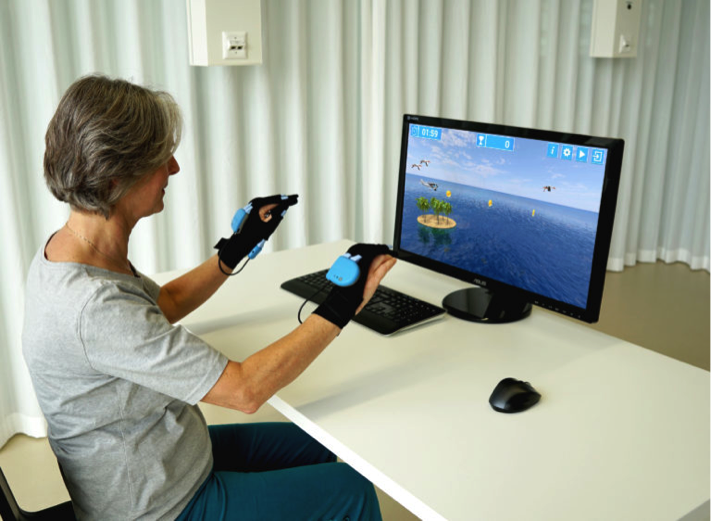
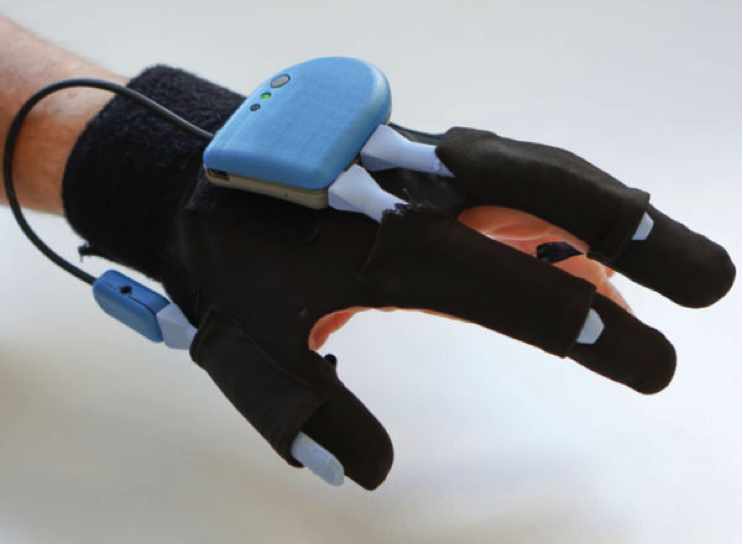
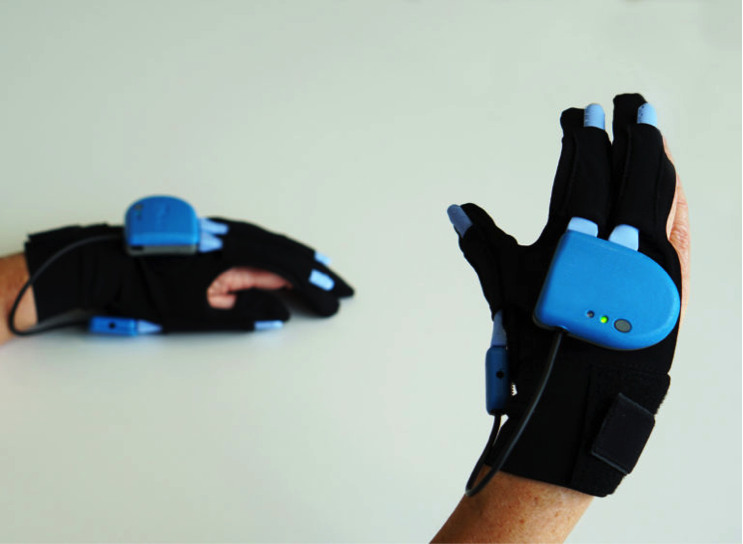
Reha-Stim Bi-Manu-Trainer软体康复机器人手套-智能康复手套
Reha-Stim Bi-Manu-Trainer软体康复机器人手套-智能康复手套,支持感觉运动和认知障碍患者康复期间训练,是脑卒中患者手功能康复的创新产品。它利用虚拟现实为基础的游戏和先进的传感器技术提供了视觉运动手指,手和手臂的协调与互动,交互式的单手和双手训练练习。具有主从康复、被动康复、虚拟现实游戏、康复评估等多种功能。基于游戏的学习方法可以增加患者参与主动训练的积极性,也有利于提高训练的强度。
- 通过基于游戏的学习提高患者积极性
- 视觉反馈支持治疗,并允许患者独立训练
- 压力传感器用于改善ADL日常生活能力的相关培训
原装进口
| Bi-Manu-Trainer | Reha-Stim Bi-Manu-Trainer软体康复机器人手套-智能康复手套 | 电邮询价 |
Reha-Stim Bi-Manu-Trainer The Bi-Manu-Trainer supports patients with sensory-motor and cognitive impairment during rehabilitation. It provides interactive uni- and bimanual training exercises with focus on visuomotor finger, hand and arm coordination using Virtual Reality based games and sophisticated sensor technology. The game-based learning approach leads to high patient motivation resulting in higher training intensity. High patient motivation through game-based learning Challenging therapeutic training games lead to high patient motivation and ensure a long-lasting patient adherence. This approach leads to an up to three times higher intensity compared to conventional therapy. Visual feedback supports the therapist and allows independent training The intuitive software is easy-to-use for every patient and visualizes the training success. It thus supports therapists with a direct feedback to the patient. The compact design and simple setup of the Bi-Manu-Trainer allows an independent training of patients saving time for therapists. Pressure sensor for improved ADL relevant training A force sensor allows the therapy to focus on finger sensitivity and force. It supports the training of ADL relevant functional tasks, e.g. the paretic arm supports the healthy arm’s task performance (e.g. when cutting vegetables etc.).
Reha-Stim Bi-Manu-Trainer The Bi-Manu-Trainer supports patients with sensory-motor and cognitive impairment during rehabilitation. It provides interactive uni- and bimanual training exercises with focus on visuomotor finger, hand and arm coordination using Virtual Reality based games and sophisticated sensor technology. The game-based learning approach leads to high patient motivation resulting in higher training intensity. High patient motivation through game-based learning Challenging therapeutic training games lead to high patient motivation and ensure a long-lasting patient adherence. This approach leads to an up to three times higher intensity compared to conventional therapy. Visual feedback supports the therapist and allows independent training The intuitive software is easy-to-use for every patient and visualizes the training success. It thus supports therapists with a direct feedback to the patient. The compact design and simple setup of the Bi-Manu-Trainer allows an independent training of patients saving time for therapists. Pressure sensor for improved ADL relevant training A force sensor allows the therapy to focus on finger sensitivity and force. It supports the training of ADL relevant functional tasks, e.g. the paretic arm supports the healthy arm’s task performance (e.g. when cutting vegetables etc.).
Reha-Stim Bi-Manu-Trainer The Bi-Manu-Trainer supports patients with sensory-motor and cognitive impairment during rehabilitation. It provides interactive uni- and bimanual training exercises with focus on visuomotor finger, hand and arm coordination using Virtual Reality based games and sophisticated sensor technology. The game-based learning approach leads to high patient motivation resulting in higher training intensity. High patient motivation through game-based learning Challenging therapeutic training games lead to high patient motivation and ensure a long-lasting patient adherence. This approach leads to an up to three times higher intensity compared to conventional therapy. Visual feedback supports the therapist and allows independent training The intuitive software is easy-to-use for every patient and visualizes the training success. It thus supports therapists with a direct feedback to the patient. The compact design and simple setup of the Bi-Manu-Trainer allows an independent training of patients saving time for therapists. Pressure sensor for improved ADL relevant training A force sensor allows the therapy to focus on finger sensitivity and force. It supports the training of ADL relevant functional tasks, e.g. the paretic arm supports the healthy arm’s task performance (e.g. when cutting vegetables etc.).
Reha-Stim Bi-Manu-Trainer The Bi-Manu-Trainer supports patients with sensory-motor and cognitive impairment during rehabilitation. It provides interactive uni- and bimanual training exercises with focus on visuomotor finger, hand and arm coordination using Virtual Reality based games and sophisticated sensor technology. The game-based learning approach leads to high patient motivation resulting in higher training intensity. High patient motivation through game-based learning Challenging therapeutic training games lead to high patient motivation and ensure a long-lasting patient adherence. This approach leads to an up to three times higher intensity compared to conventional therapy. Visual feedback supports the therapist and allows independent training The intuitive software is easy-to-use for every patient and visualizes the training success. It thus supports therapists with a direct feedback to the patient. The compact design and simple setup of the Bi-Manu-Trainer allows an independent training of patients saving time for therapists. Pressure sensor for improved ADL relevant training A force sensor allows the therapy to focus on finger sensitivity and force. It supports the training of ADL relevant functional tasks, e.g. the paretic arm supports the healthy arm’s task performance (e.g. when cutting vegetables etc.).
Reha-Stim Bi-Manu-Trainer The Bi-Manu-Trainer supports patients with sensory-motor and cognitive impairment during rehabilitation. It provides interactive uni- and bimanual training exercises with focus on visuomotor finger, hand and arm coordination using Virtual Reality based games and sophisticated sensor technology. The game-based learning approach leads to high patient motivation resulting in higher training intensity. High patient motivation through game-based learning Challenging therapeutic training games lead to high patient motivation and ensure a long-lasting patient adherence. This approach leads to an up to three times higher intensity compared to conventional therapy. Visual feedback supports the therapist and allows independent training The intuitive software is easy-to-use for every patient and visualizes the training success. It thus supports therapists with a direct feedback to the patient. The compact design and simple setup of the Bi-Manu-Trainer allows an independent training of patients saving time for therapists. Pressure sensor for improved ADL relevant training A force sensor allows the therapy to focus on finger sensitivity and force. It supports the training of ADL relevant functional tasks, e.g. the paretic arm supports the healthy arm’s task performance (e.g. when cutting vegetables etc.).
Reha-Stim Bi-Manu-Trainer The Bi-Manu-Trainer supports patients with sensory-motor and cognitive impairment during rehabilitation. It provides interactive uni- and bimanual training exercises with focus on visuomotor finger, hand and arm coordination using Virtual Reality based games and sophisticated sensor technology. The game-based learning approach leads to high patient motivation resulting in higher training intensity. High patient motivation through game-based learning Challenging therapeutic training games lead to high patient motivation and ensure a long-lasting patient adherence. This approach leads to an up to three times higher intensity compared to conventional therapy. Visual feedback supports the therapist and allows independent training The intuitive software is easy-to-use for every patient and visualizes the training success. It thus supports therapists with a direct feedback to the patient. The compact design and simple setup of the Bi-Manu-Trainer allows an independent training of patients saving time for therapists. Pressure sensor for improved ADL relevant training A force sensor allows the therapy to focus on finger sensitivity and force. It supports the training of ADL relevant functional tasks, e.g. the paretic arm supports the healthy arm’s task performance (e.g. when cutting vegetables etc.).
Reha-Stim Bi-Manu-Trainer The Bi-Manu-Trainer supports patients with sensory-motor and cognitive impairment during rehabilitation. It provides interactive uni- and bimanual training exercises with focus on visuomotor finger, hand and arm coordination using Virtual Reality based games and sophisticated sensor technology. The game-based learning approach leads to high patient motivation resulting in higher training intensity. High patient motivation through game-based learning Challenging therapeutic training games lead to high patient motivation and ensure a long-lasting patient adherence. This approach leads to an up to three times higher intensity compared to conventional therapy. Visual feedback supports the therapist and allows independent training The intuitive software is easy-to-use for every patient and visualizes the training success. It thus supports therapists with a direct feedback to the patient. The compact design and simple setup of the Bi-Manu-Trainer allows an independent training of patients saving time for therapists. Pressure sensor for improved ADL relevant training A force sensor allows the therapy to focus on finger sensitivity and force. It supports the training of ADL relevant functional tasks, e.g. the paretic arm supports the healthy arm’s task performance (e.g. when cutting vegetables etc.).
Reha-Stim Bi-Manu-Trainer The Bi-Manu-Trainer supports patients with sensory-motor and cognitive impairment during rehabilitation. It provides interactive uni- and bimanual training exercises with focus on visuomotor finger, hand and arm coordination using Virtual Reality based games and sophisticated sensor technology. The game-based learning approach leads to high patient motivation resulting in higher training intensity. High patient motivation through game-based learning Challenging therapeutic training games lead to high patient motivation and ensure a long-lasting patient adherence. This approach leads to an up to three times higher intensity compared to conventional therapy. Visual feedback supports the therapist and allows independent training The intuitive software is easy-to-use for every patient and visualizes the training success. It thus supports therapists with a direct feedback to the patient. The compact design and simple setup of the Bi-Manu-Trainer allows an independent training of patients saving time for therapists. Pressure sensor for improved ADL relevant training A force sensor allows the therapy to focus on finger sensitivity and force. It supports the training of ADL relevant functional tasks, e.g. the paretic arm supports the healthy arm’s task performance (e.g. when cutting vegetables etc.).
Reha-Stim Bi-Manu-Trainer The Bi-Manu-Trainer supports patients with sensory-motor and cognitive impairment during rehabilitation. It provides interactive uni- and bimanual training exercises with focus on visuomotor finger, hand and arm coordination using Virtual Reality based games and sophisticated sensor technology. The game-based learning approach leads to high patient motivation resulting in higher training intensity. High patient motivation through game-based learning Challenging therapeutic training games lead to high patient motivation and ensure a long-lasting patient adherence. This approach leads to an up to three times higher intensity compared to conventional therapy. Visual feedback supports the therapist and allows independent training The intuitive software is easy-to-use for every patient and visualizes the training success. It thus supports therapists with a direct feedback to the patient. The compact design and simple setup of the Bi-Manu-Trainer allows an independent training of patients saving time for therapists. Pressure sensor for improved ADL relevant training A force sensor allows the therapy to focus on finger sensitivity and force. It supports the training of ADL relevant functional tasks, e.g. the paretic arm supports the healthy arm’s task performance (e.g. when cutting vegetables etc.).
相关产品



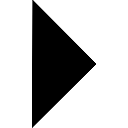
 显示该栏目以下所有产品
显示该栏目以下所有产品
